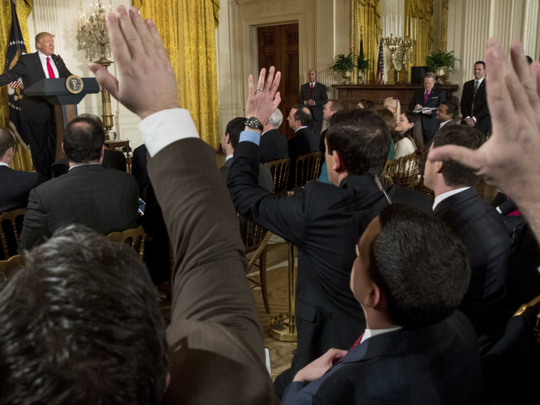
This weekend brought the latest salvo in President Donald Trump’s campaign to discredit the news media. Friday afternoon the president tweeted “The FAKE NEWS media (failing @nytimes, @NBCNews, @ABC, @CBS, @CNN) is not my enemy, it is the enemy of the American People!”
In an appearance on NBC’s Meet the Press, Reince Priebus, the president’s chief of staff, tried to clarify the meaning of the tweet and reassure Americans that “The president believes in the First Amendment. He believes in a free press.” Nonetheless, commentators correctly noted that the phrase “enemy of the people” has notorious associations from the purges ordered by Soviet dictator Josef Stalin, which killed tens of millions of people. Public officials also expressed alarm.
“As an American diplomat,” Tom Malinowski, assistant secretary of state for democracy, human rights and labour in the Obama Administration, said: “I stood up to petty tyrants who called journalists ‘enemies of the people.’ Guess that’s not our policy anymore.” And, Senator John McCain, appearing on the same television program as Priebus, sternly reacted to Trump’s tweet by observing “that’s how dictators get started... When you look at history, the first thing that dictators do is shut down the press.”
McCain and others dismayed by the phrase “enemies of the people” are pointing to the lessons of other countries’ histories, where tyranny has wreaked such havoc. But, we also have lessons to learn from American history as we seek to safeguard the rights guaranteed under the US Constitution.
We must recognise that freedom of the press is neither deeply enshrined in our legal traditions, nor in the affections of the American people. It cannot be taken for granted. Celebrated US Supreme Court decisions do afford the press important protections. In 1964, the court held that public officials could only prove that they had been libelled in a newspaper if they could show that false statements were made with “actual malice” and that news organisations had published a falsehood with “reckless disregard of whether it was false or not.”
Subsequently, in the so-called Pentagon Papers case, the court held that prior restraint of newspapers was unconstitutional. “The government’s power to censor the press,” Justice Hugo Black wrote: “was abolished so that the press would remain forever free to censure the government. The press was protected so that it could bare the secrets of government and inform the people.”
Yet, the courts have also accepted significant legal limits on the ability of the press to do the work that Justice Black so nobly assigned to it. One year after its Pentagon Papers decision, the Supreme Court refused to accord First Amendment protection to reporters who did not reveal confidential sources to a grand jury. While it acknowledged that its decision would undermine the ability of the press to gather news, it held that reporters did not have “a testimonial privilege that other citizens do not enjoy.”
Despite state laws that are designed to protect a reporter’s sources, news people regularly find themselves fined or threatened with jail for refusing to reveal their sources. Thus, in 2004, when New York Times reporter Judith Miller would not tell a grand jury investigating the leaked identity of a CIA operative the source of that leak, she was sentenced to 18 months in jail. Her sentence was unanimously upheld by the United States Court of Appeals for the District of Columbia Circuit.
Beyond the courts, support for the press and the work that it does is no more secure or certain. Two decades ago surveys found that about two-thirds of Americans thought that newspapers should be allowed to publish without government approval of a story. Yet other studies have found that more than half of the American public thinks that the press has “too much freedom.”
The Gallup poll recently reported that “Before 2004, it was common for a majority of Americans to profess at least some trust in the mass media, but since then, less than half of Americans feel that way.”
“Now,” Gallup continued, “only about a third of the US has any trust in the Fourth Estate, a stunning development for an institution designed to inform the public.”
Proliferation of news media means that Americans can now easily find sources to confirm their pre-existing opinions and others which do not support their views and, as a result, seem to be outrageously biased and distorted. One person’s uncontestable truth is another’s “fake news.”
As a result, when President Trump attacks the media, he is preaching to a substantial audience of people who are already converted. Resisting those attacks will not be easy, and success in those efforts is by no means certain. If we are to restore trust and belief in the importance of a free press in our democracy, the press will have to take dramatic steps to reverse public perceptions that news reporting is just another part of a partisan tug-of-war.
It will have to do some serious soul-searching and act to insure that neutrality and objectivity matter more than generating audiences. The news media must demonstrate its own commitment to telling the unvarnished truth to a public that, at times, seems to prefer other messages.
As the press undertakes this arduous task, we would do well to remember Thomas Jefferson’s view that “Our liberty cannot be guarded but by the freedom of the press.”
For Jefferson and his contemporaries a self-governing people had no greater friend than a free press.
— Guardian News & Media Ltd
Austin Sarat is Associate Dean of the Faculty and William Nelson Cromwell Professor Jurisprudence & Political Science at Amherst College.








